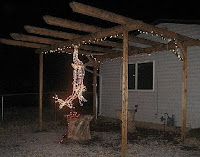A Woman in Berlin
I just finished a book given to me for Christmas. It's called A Woman In Berlin: Eight Weeks in the Conquered City. It's an anonymous diary written by a 30ish German woman at the fall of Berlin to the Russians. I'm trying to process it all. In some ways it was very predictable - starvation, rape, uncertainty. In other ways, it's incredibly profound. One concept which is sticking with me is the difference in how women and men deal with crisis. The book jacket repeatedly mentions the trauma of "mass rape" which the Russian conquerers officially called "forced intercourse." The interesting element to me is how the women dealt with the trauma and the reality. Anonymous is a pragmatist, knowing that she must survive while acknowledging the long term impact, especially upon the return of her pre-war lover. In a general sense the Germen men seem weak and unable to deal, while the Russians are divided into lower class commoners, intent on drink and sex, and the "noble" officers who try to modify these same drives with cleanliness and formal civility. The one heroic act described within the diary is a man who attacks a Russian who is accosting his wife.
The other aspect that seems intense to me is the ability of the narrator to step outside herself and comment on her own moral and physical state. Somehow she manages to provide objective reflection on her status. Is this the trait that allows her to survive when others fail?
Of course, the logical extension of reading this is to ask "where are we headed?" When times get hard to folks band together to help and support one another? They do in the book, to a point, until the order they're used to dissolves completely. Or, as our society struggles, will we turn against each other, every man and woman for herself? What bonds will prevail? Anonymous talks about babies starving from lack of milk, and of mothers who trade their children's milk rations for cigarettes and booze. Will we in 2008 be any different? Can we forgive the lapses of civilians in a time of war, when we increasingly hold our solidiers accountable?
I can't imagine being in a situation where I'm watching my children starve. What lengths would I go to?
The other aspect that seems intense to me is the ability of the narrator to step outside herself and comment on her own moral and physical state. Somehow she manages to provide objective reflection on her status. Is this the trait that allows her to survive when others fail?
Of course, the logical extension of reading this is to ask "where are we headed?" When times get hard to folks band together to help and support one another? They do in the book, to a point, until the order they're used to dissolves completely. Or, as our society struggles, will we turn against each other, every man and woman for herself? What bonds will prevail? Anonymous talks about babies starving from lack of milk, and of mothers who trade their children's milk rations for cigarettes and booze. Will we in 2008 be any different? Can we forgive the lapses of civilians in a time of war, when we increasingly hold our solidiers accountable?
I can't imagine being in a situation where I'm watching my children starve. What lengths would I go to?

Comments